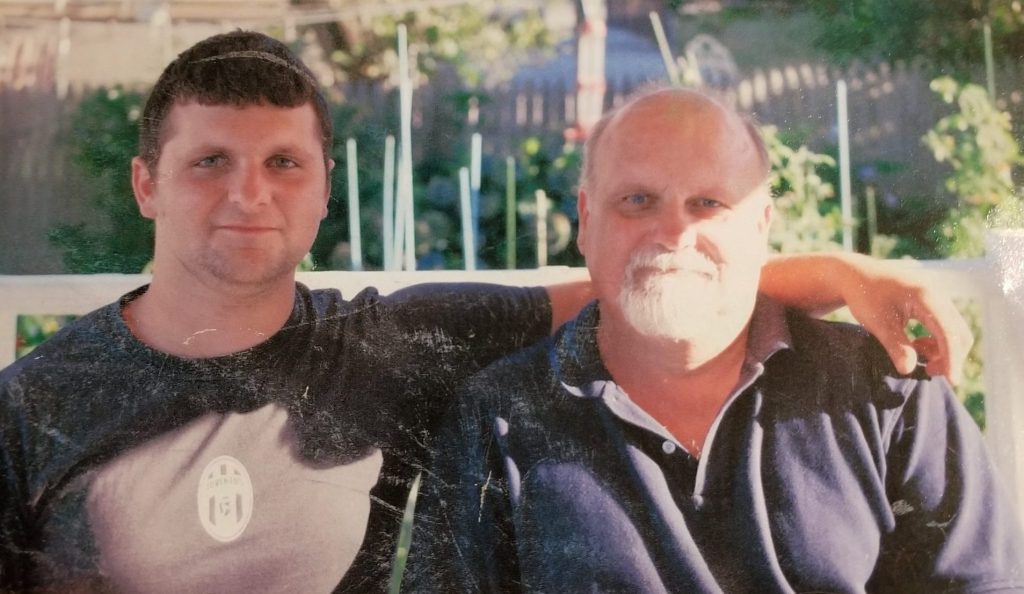
Peer Grief Helper Profile: Dave Swindell
By Kerry J. Bickford
When Dave Swindell talks about his son Christopher, his face lights up with a half-smile and memories of good times dance in his eyes. This is heartbreaking to witness since Chris, the middle child of three, died on July 13, 2018, of an accidental overdose. This profile is really about Dave, but the story cannot be told without introducing a son, a brother and an uncle who left a footprint on the hearts of those who mourn his loss.
Dave proudly recollects the days when Chris was an athletic stand out, captain of his high school soccer team, MVP, top goal scorer, and league all-star, to name just a few of his many accomplishments. He had more than his share of bragging rights, but Dave is proudest of his son’s compassion.
“Chris would frequently be drawn to the lunch table of students who were left out, many of whom saw him as their “hero,” recalls Dave.
This knack for connecting with others progressed from roles as peer mediator and Mock Trial defense lawyer in high school to mentoring others during his recovery journey and at his sober home years later. Still, as hard as he tried to remain drug free, Chris slipped up that day in July, and Dave’s phone rang at 1:43 a.m. with the news that “Chris is gone,” the day before his sister’s wedding.
“While growing up Chris did everything at 100%” says David. “This drive led to numerous broken bones and the introduction of oxycontin into his young life.” (They eventually learned that he overdosed on fentanyl.)
As Dave sees it, a series of sports injuries and concussions during his college years led Chris back to oxycontin. His life began to spin out of control, resulting in a brief hiatus from school and from his beloved soccer team. Then, despite several desperate attempts to get it together, including working as an assistant soccer coach for his former high school, he sank into the world of opiates.
Dave and his wife, Karen, tried to support their son in every way possible, including, eventually, practicing tough love. They supported a move to a sober home in Portland, Maine, where Chris could begin a new life and where he faithfully attended the local support group meetings.
Three days after Chris’s death, Learn to Cope members were shocked when Dave and Karen walked into their meeting hand in hand. As Dave puts it, “I believe in ‘walking into the lion’s den.’ I knew I needed to face it, and it was not gonna go away.” He continued to attend these meetings for months while processing his grief, because this was a group he trusted and these were people he felt safe with. He felt driven to let them know “if the worst happens to you, you can survive.”
On August 31, 2019, one month after Chris’s death, Dave and Karen successfully conducted Milford’s first Overdose Awareness Day. Months later, Dave and Chris’s siblings formed an Advisory Committee to help launch a peer grief support sibling group in Massachusetts.
By January of 2019 Dave began attending a peer-grief support meeting in Milford and by March he was co-facilitating the group for adults who have lost someone to overdose. By summertime, he was also co-facilitating a group in Marlborough This work kept him in the eye of the storm, even during the COVID-19 pandemic, when services came to a screeching halt everywhere, but especially in the worlds of addiction, recovery and grief support. Dave’s willingness to help others navigate their own voyage during their darkest hours exemplifies the commitment of a peer grief support facilitator.
Dave’s latest venture is a virtual men’s group which he co-facilitates with Franklin Cook of SADOD. This group is unique in that, much like the sibling group, addresses an unmet need for a sub-group of people. Dave is relentlessly passionate about “eliminating the stigma” associated with these deaths and he tells others: “Hold your head up high. I’m not going to let it stigmatize my life or yours.”
His ability to balance being in the presence of suffering and focusing on healing is a lesson we could all learn from.
Dave is proud of who Chris was a human being. He believes strongly that those who have died by overdose should not be remembered solely for their addiction. He often says, “You can look at all of Chris’s athletic accomplishments, but let me tell you about the person Chris was.” He encourages loved ones of those who have died by accidental overdose to focus on how they lived, not how they died. He leads by example.
Dave continues to be dedicated to building programs that help others, while in his mind's eye, he still sees a beloved boy running down the soccer field.
Recently, Milford High School hung a banner at the entrance to the school’s gymnasium in Chris’s honor for the most points ever scored by a soccer player. Chris’s Corner — a recovery resource center in Milford -- has also recently been named after Chris.
“My son taught me to help others, to reach out further,” concludes Dave. “ Chris has made me a better person.”
